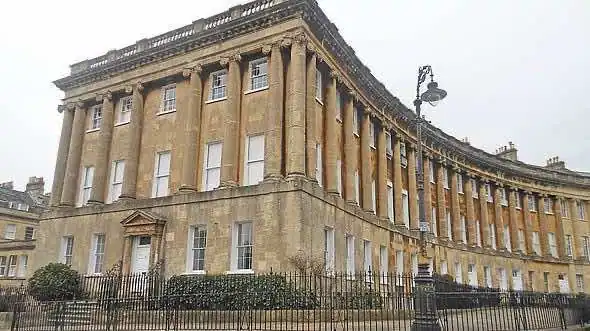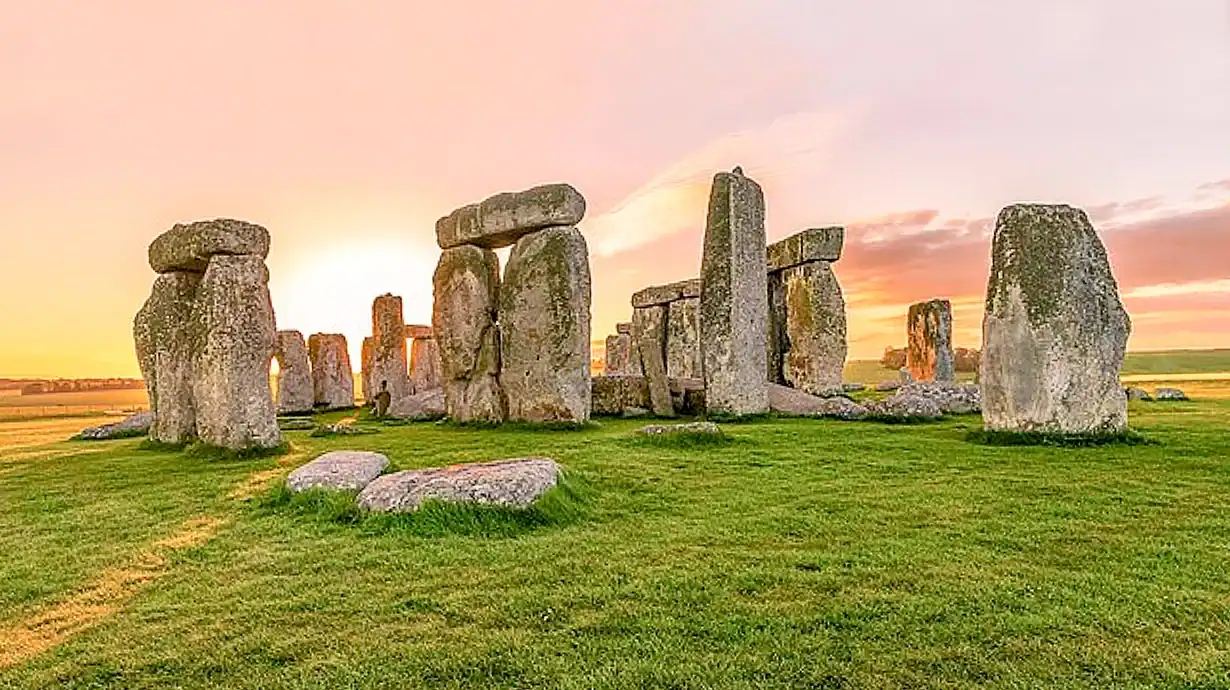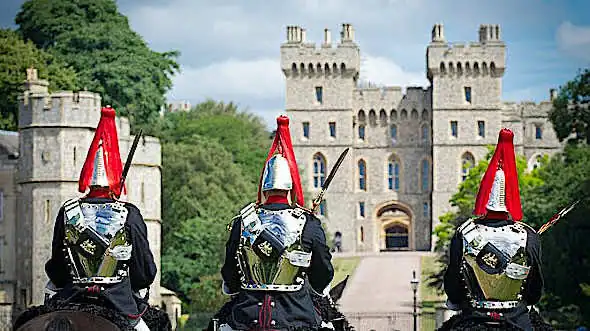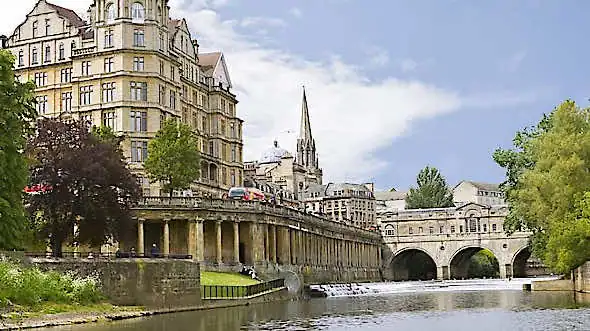
I wish they would bring back British Rail. At least with British Rail you already knew it was useless so you weren’t disappointed, but they promised me two things on this train and I got neither. First of all I booked a window seat but they stuck me next to a partition (that big plastic strut between two windows) so the only way of seeing outside was with X-ray eyes. But that didn’t matter because somebody else was sitting in it anyway! I paid for a seat number but they forgot to put a card in the back of the seat, so by the time I boarded the train it was already taken. Half of the carriage was full of people arguing about who was sitting where. Nobody wants to move once they’re settled, do they – so you’re stuffed. Ah well… such is life. What do you expect for a seventy quid ticket?
The first things you notice when you pull into Bath are the pretty sandstone-coloured houses perched precariously on the side of a hill. That’s the first thing that I liked about Bath – the colour of it. I did a bit of research beforehand (always handy when you’re visiting a new town for the first time) so I already knew three things that I wanted to see: the Roman Baths, Bath Abbey and the Royal Crescent. Happily the first two are right next-door to each other, so you might as well do them at the start.
The Romans certainly knew how to have a bath. Can you imagine us having an hour-long soak before work these days? We wouldn’t have time. For us it’s a quick five-minute shower and out the door with our shirt roughly stuffed into our trousers as we run for the bus. When the archaeologists dig us up in a thousand years time all they’re going to find is a plastic toothbrush and a stainless steel sink. No murals or mosaics for them. Just a tatty bit of lino and a plastic bog brush with the bristles missing. The Romans had cold rooms, warm rooms, hot rooms, dip pools, massage tables… they really went to town with it. But I suppose when you live in an age without computers and TV what else are you going to do? You may as well go into town for a bath.
As soon as you’ve handed over the entrance money and picked up your audio-guide you head straight towards the main bath. That’s where I am right now, peering down at the pea green water. I can see a few fake Roman soldiers down there dressed up in their centurion togs, and some six-foot statues of Roman emperors balancing on the balcony. It looks quite impressive with the Abbey towering up behind, but then you start listening to the audio guide and discover that a lot of what you’re looking at is modern. Everything above ground level seems to have been built by the Victorians (including those brown sandstone columns around the edge). The Roman remains are basically just the plunge pool itself and some stubs of wall up to about six feet in height. You’d never realise that just by looking at it, though – it still looks very old and I almost wish they hadn’t told me the truth!
After that you head down into their little museum space which is full of old coins and busted bits of brick and bones – the usual kind of fare that you’d expect to find in a museum. Further on are the remains of a room that reminded me of the Billingsgate Bath House in London – it’s an area of stubby stone walls, drains and pavement that you can examine from the walkway suspended above the floor. It’s quite atmospheric down there in the dark.
Then you descend down another level… down to the mysterious thermal spring itself. Bubbling water is spewing out of a stone arch and splashing all over some orange rocks, with clouds of steam bubbling up into a mist. They’ve also got some remains of various plunge pools, warm rooms (tepidarium) and hot rooms (caldarium) – they really do have it all: the ruins are huge.
After that you get to walk around the main bath at ground level (and have a chat with that Roman soldier). If you were quick then you could probably jump in for a swim while he wasn’t looking, but I have a rule that I never jump into anything that is bright green – and this water is bright green.
Don’t forget to find the little drinking fountain at the end of the tour and take a sip from the miracle spring. The Romans believed that one sip from these waters will cure you of all illnesses… so obviously I had a taste. It tasted a bit weird to me but I’m going to live forever now so I don’t care. I am immortal! It reminded me of that scene at the end of Indiana Jones and The Last Crusade when he splashed some holy water over his dad.
Next up… Bath Abbey. You have to donate a few quid to get inside but it’s well worth it. I’m a sucker for stained glass windows and this place has some of the finest I’ve ever seen. A lot of cathedrals just have a big one at either end and a few piddly ones in the middle, but practically every window in here is a solid slice of rainbow. They really are impressive. I’m still ranking Westminster Abbey and Brompton Oratory as my all-time favourite religious buildings, but this one definitely comes an honourable third.
If you fancy a bit of exercise then you can climb up the tower and look out across Bath. Unfortunately my knees were playing up today so I had to give it a miss.
After that… time for lunch and a stroll around town. The town is surprisingly big if you want to try and fill up an entire day, but I think a couple of hours should be enough for most people. Pretty much all of the streets around the Roman Baths and Abbey are worth a look, especially near Parade Gardens. They’ve got an impressive bridge across a thundering weir that’s a very fine sight: Pulteney Bridge. If you’re feeling energetic then take a long walk up Great Pulteney Street to the Holburne Museum.
Now head past Queen Square to The Circus – a big ring of Georgian houses around a green with two huge trees in the middle. I thought it was more impressive than the famous Royal Crescent. Whenever you see a picture of Bath the chances are it will be a picture of the Crescent – a semi-circular row of houses on top of a hill – but it’s not until you actually get up close that you realise they are quite grotty. I’m being serious! Obviously I don’t mean grotty in a rundown council house kind-of way… they probably still cost a bazillion quid to live in. But they don’t seem to be making much of an effort to keep them Georgian. Half of the front doors and windows are bright white and modern, and if you want a real shock then go round the back and view them from behind. The phrase “back end of a bus” comes to mind.
If you want to fill up a bit more time then check out the museum at No.1 which is decorated it with Georgian-era furniture to give you an idea of what it must have been like in its hey-day, but they’ve ruined the rooms with a series of school teacher-like guides. There’s a different one lurking behind each door and you have to stand there for five minutes listening to their monologue. You end up standing there politely smiling until you’re finally allowed to leave (if you’re still awake).
I decided to fill up my final hour with a sightseeing bus around the city (you can catch it outside the Abbey). It lasts for just under an hour and you get to see all of the best-looking buildings again, and hear a lot of interesting history without having to wear out your shoes.
If you’re interested in Roman archaeology then try the Roman amphitheatre in the basement of the Guildhall Art Gallery. The London Mithraeum and Billingsgate Roman House and Baths are worth a look as well. Or you could see the whole lot on our self-guided walk around Roman London
Events in Bath


